Role Play: Interprofessional Communication for Post-MI Patient Care
VerifiedAdded on 2023/06/10
|8
|1805
|223
Report
AI Summary
This assignment features a role-play scenario centered around a 65-year-old male patient, John, who has recently experienced a myocardial infarction (MI) and received two stents. The role-play demonstrates communication between the nurse, the doctor, and the patient's wife, Karen, covering topics such as concerns about future health complications, the purpose of stents, potential side effects, and lifestyle changes necessary for recovery. The scenario emphasizes the importance of active listening, empathy, and interprofessional collaboration in ensuring the patient's well-being and adherence to the treatment plan. The reflection highlights the skills required for effective patient care, including compassion, communication, and attention to detail, while also addressing potential challenges such as patient non-compliance and lack of empathy from healthcare staff. The role-play aims to empower the patient through motivational interviewing and establish a strong therapeutic relationship between the healthcare providers and the patient and his family.The document includes a bibliography referencing relevant research on patient empowerment, stent implantation, and interprofessional communication.

Running head: ROLE PLAY
Scenario 4
Name of the Student
Name of the University
Author Note
Scenario 4
Name of the Student
Name of the University
Author Note
Paraphrase This Document
Need a fresh take? Get an instant paraphrase of this document with our AI Paraphraser
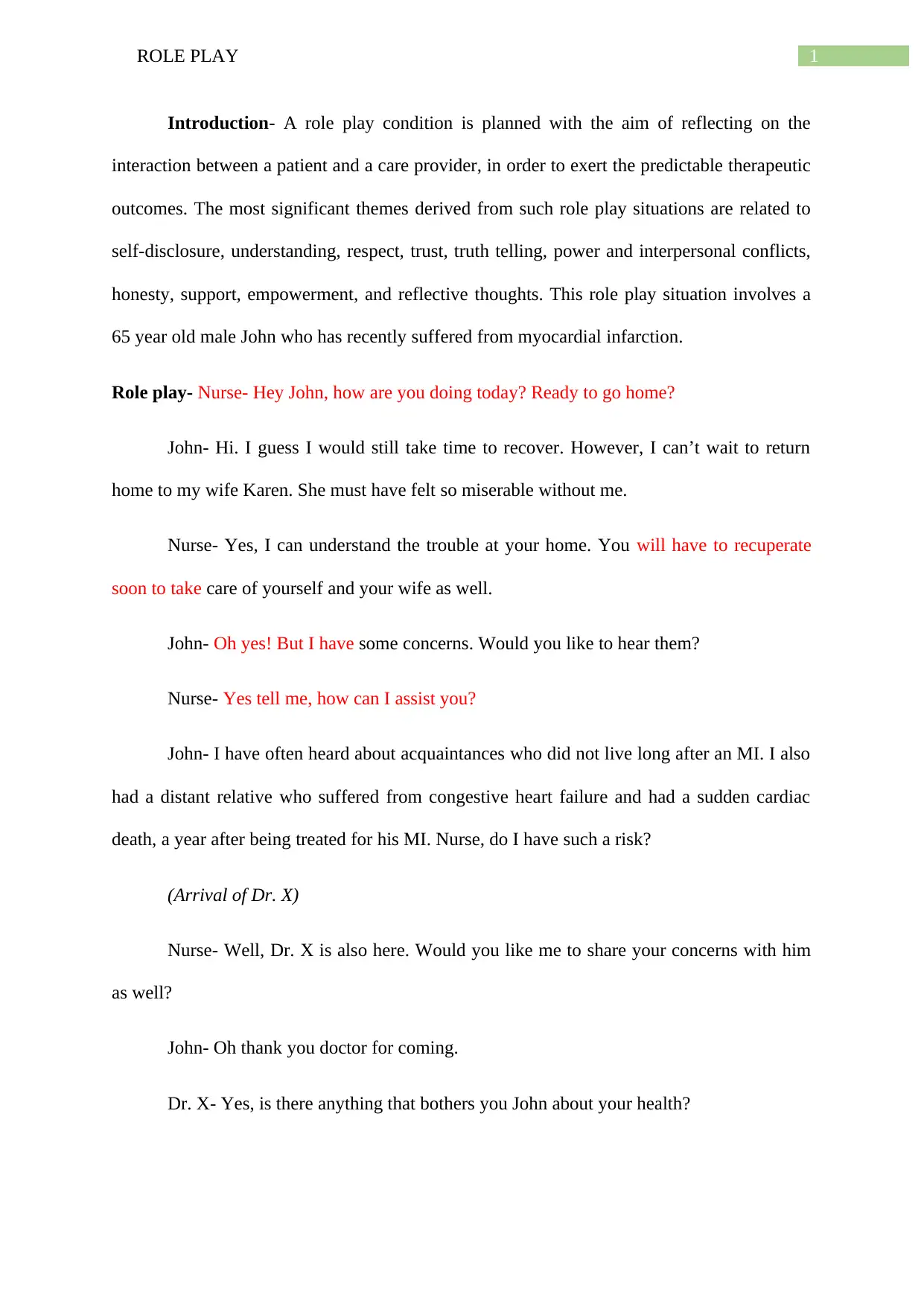
1ROLE PLAY
Introduction- A role play condition is planned with the aim of reflecting on the
interaction between a patient and a care provider, in order to exert the predictable therapeutic
outcomes. The most significant themes derived from such role play situations are related to
self-disclosure, understanding, respect, trust, truth telling, power and interpersonal conflicts,
honesty, support, empowerment, and reflective thoughts. This role play situation involves a
65 year old male John who has recently suffered from myocardial infarction.
Role play- Nurse- Hey John, how are you doing today? Ready to go home?
John- Hi. I guess I would still take time to recover. However, I can’t wait to return
home to my wife Karen. She must have felt so miserable without me.
Nurse- Yes, I can understand the trouble at your home. You will have to recuperate
soon to take care of yourself and your wife as well.
John- Oh yes! But I have some concerns. Would you like to hear them?
Nurse- Yes tell me, how can I assist you?
John- I have often heard about acquaintances who did not live long after an MI. I also
had a distant relative who suffered from congestive heart failure and had a sudden cardiac
death, a year after being treated for his MI. Nurse, do I have such a risk?
(Arrival of Dr. X)
Nurse- Well, Dr. X is also here. Would you like me to share your concerns with him
as well?
John- Oh thank you doctor for coming.
Dr. X- Yes, is there anything that bothers you John about your health?
Introduction- A role play condition is planned with the aim of reflecting on the
interaction between a patient and a care provider, in order to exert the predictable therapeutic
outcomes. The most significant themes derived from such role play situations are related to
self-disclosure, understanding, respect, trust, truth telling, power and interpersonal conflicts,
honesty, support, empowerment, and reflective thoughts. This role play situation involves a
65 year old male John who has recently suffered from myocardial infarction.
Role play- Nurse- Hey John, how are you doing today? Ready to go home?
John- Hi. I guess I would still take time to recover. However, I can’t wait to return
home to my wife Karen. She must have felt so miserable without me.
Nurse- Yes, I can understand the trouble at your home. You will have to recuperate
soon to take care of yourself and your wife as well.
John- Oh yes! But I have some concerns. Would you like to hear them?
Nurse- Yes tell me, how can I assist you?
John- I have often heard about acquaintances who did not live long after an MI. I also
had a distant relative who suffered from congestive heart failure and had a sudden cardiac
death, a year after being treated for his MI. Nurse, do I have such a risk?
(Arrival of Dr. X)
Nurse- Well, Dr. X is also here. Would you like me to share your concerns with him
as well?
John- Oh thank you doctor for coming.
Dr. X- Yes, is there anything that bothers you John about your health?
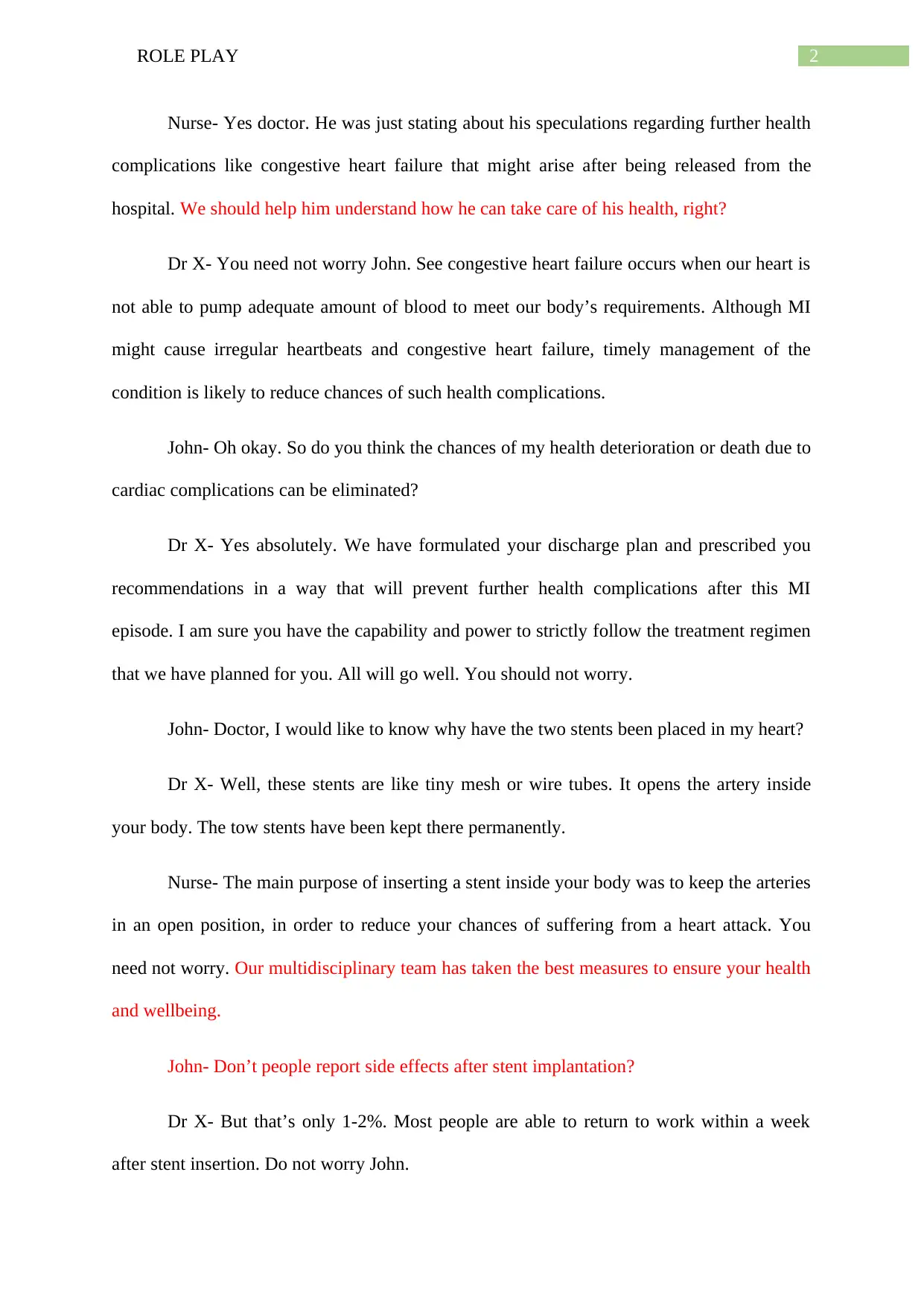
2ROLE PLAY
Nurse- Yes doctor. He was just stating about his speculations regarding further health
complications like congestive heart failure that might arise after being released from the
hospital. We should help him understand how he can take care of his health, right?
Dr X- You need not worry John. See congestive heart failure occurs when our heart is
not able to pump adequate amount of blood to meet our body’s requirements. Although MI
might cause irregular heartbeats and congestive heart failure, timely management of the
condition is likely to reduce chances of such health complications.
John- Oh okay. So do you think the chances of my health deterioration or death due to
cardiac complications can be eliminated?
Dr X- Yes absolutely. We have formulated your discharge plan and prescribed you
recommendations in a way that will prevent further health complications after this MI
episode. I am sure you have the capability and power to strictly follow the treatment regimen
that we have planned for you. All will go well. You should not worry.
John- Doctor, I would like to know why have the two stents been placed in my heart?
Dr X- Well, these stents are like tiny mesh or wire tubes. It opens the artery inside
your body. The tow stents have been kept there permanently.
Nurse- The main purpose of inserting a stent inside your body was to keep the arteries
in an open position, in order to reduce your chances of suffering from a heart attack. You
need not worry. Our multidisciplinary team has taken the best measures to ensure your health
and wellbeing.
John- Don’t people report side effects after stent implantation?
Dr X- But that’s only 1-2%. Most people are able to return to work within a week
after stent insertion. Do not worry John.
Nurse- Yes doctor. He was just stating about his speculations regarding further health
complications like congestive heart failure that might arise after being released from the
hospital. We should help him understand how he can take care of his health, right?
Dr X- You need not worry John. See congestive heart failure occurs when our heart is
not able to pump adequate amount of blood to meet our body’s requirements. Although MI
might cause irregular heartbeats and congestive heart failure, timely management of the
condition is likely to reduce chances of such health complications.
John- Oh okay. So do you think the chances of my health deterioration or death due to
cardiac complications can be eliminated?
Dr X- Yes absolutely. We have formulated your discharge plan and prescribed you
recommendations in a way that will prevent further health complications after this MI
episode. I am sure you have the capability and power to strictly follow the treatment regimen
that we have planned for you. All will go well. You should not worry.
John- Doctor, I would like to know why have the two stents been placed in my heart?
Dr X- Well, these stents are like tiny mesh or wire tubes. It opens the artery inside
your body. The tow stents have been kept there permanently.
Nurse- The main purpose of inserting a stent inside your body was to keep the arteries
in an open position, in order to reduce your chances of suffering from a heart attack. You
need not worry. Our multidisciplinary team has taken the best measures to ensure your health
and wellbeing.
John- Don’t people report side effects after stent implantation?
Dr X- But that’s only 1-2%. Most people are able to return to work within a week
after stent insertion. Do not worry John.
⊘ This is a preview!⊘
Do you want full access?
Subscribe today to unlock all pages.

Trusted by 1+ million students worldwide
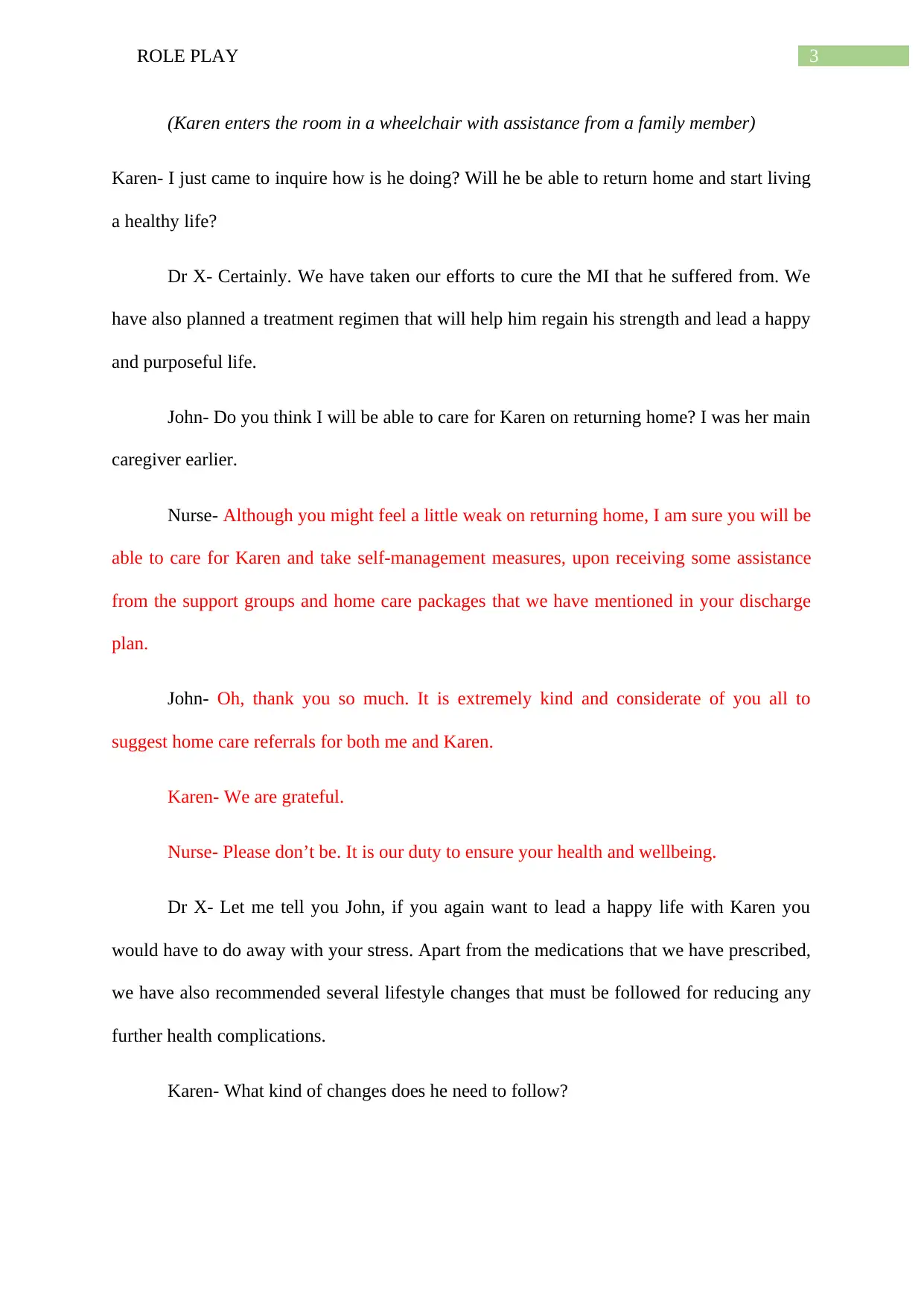
3ROLE PLAY
(Karen enters the room in a wheelchair with assistance from a family member)
Karen- I just came to inquire how is he doing? Will he be able to return home and start living
a healthy life?
Dr X- Certainly. We have taken our efforts to cure the MI that he suffered from. We
have also planned a treatment regimen that will help him regain his strength and lead a happy
and purposeful life.
John- Do you think I will be able to care for Karen on returning home? I was her main
caregiver earlier.
Nurse- Although you might feel a little weak on returning home, I am sure you will be
able to care for Karen and take self-management measures, upon receiving some assistance
from the support groups and home care packages that we have mentioned in your discharge
plan.
John- Oh, thank you so much. It is extremely kind and considerate of you all to
suggest home care referrals for both me and Karen.
Karen- We are grateful.
Nurse- Please don’t be. It is our duty to ensure your health and wellbeing.
Dr X- Let me tell you John, if you again want to lead a happy life with Karen you
would have to do away with your stress. Apart from the medications that we have prescribed,
we have also recommended several lifestyle changes that must be followed for reducing any
further health complications.
Karen- What kind of changes does he need to follow?
(Karen enters the room in a wheelchair with assistance from a family member)
Karen- I just came to inquire how is he doing? Will he be able to return home and start living
a healthy life?
Dr X- Certainly. We have taken our efforts to cure the MI that he suffered from. We
have also planned a treatment regimen that will help him regain his strength and lead a happy
and purposeful life.
John- Do you think I will be able to care for Karen on returning home? I was her main
caregiver earlier.
Nurse- Although you might feel a little weak on returning home, I am sure you will be
able to care for Karen and take self-management measures, upon receiving some assistance
from the support groups and home care packages that we have mentioned in your discharge
plan.
John- Oh, thank you so much. It is extremely kind and considerate of you all to
suggest home care referrals for both me and Karen.
Karen- We are grateful.
Nurse- Please don’t be. It is our duty to ensure your health and wellbeing.
Dr X- Let me tell you John, if you again want to lead a happy life with Karen you
would have to do away with your stress. Apart from the medications that we have prescribed,
we have also recommended several lifestyle changes that must be followed for reducing any
further health complications.
Karen- What kind of changes does he need to follow?
Paraphrase This Document
Need a fresh take? Get an instant paraphrase of this document with our AI Paraphraser
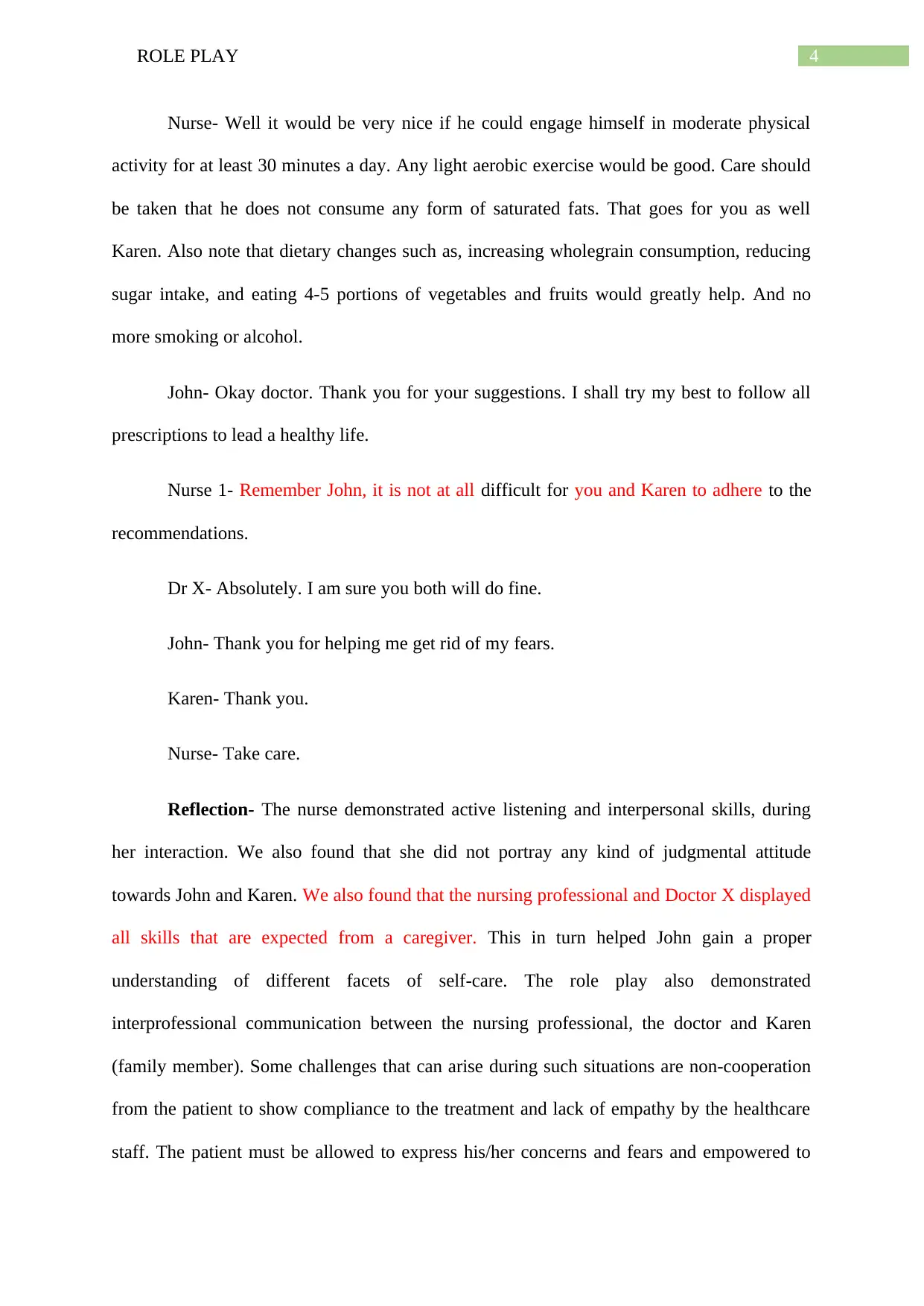
4ROLE PLAY
Nurse- Well it would be very nice if he could engage himself in moderate physical
activity for at least 30 minutes a day. Any light aerobic exercise would be good. Care should
be taken that he does not consume any form of saturated fats. That goes for you as well
Karen. Also note that dietary changes such as, increasing wholegrain consumption, reducing
sugar intake, and eating 4-5 portions of vegetables and fruits would greatly help. And no
more smoking or alcohol.
John- Okay doctor. Thank you for your suggestions. I shall try my best to follow all
prescriptions to lead a healthy life.
Nurse 1- Remember John, it is not at all difficult for you and Karen to adhere to the
recommendations.
Dr X- Absolutely. I am sure you both will do fine.
John- Thank you for helping me get rid of my fears.
Karen- Thank you.
Nurse- Take care.
Reflection- The nurse demonstrated active listening and interpersonal skills, during
her interaction. We also found that she did not portray any kind of judgmental attitude
towards John and Karen. We also found that the nursing professional and Doctor X displayed
all skills that are expected from a caregiver. This in turn helped John gain a proper
understanding of different facets of self-care. The role play also demonstrated
interprofessional communication between the nursing professional, the doctor and Karen
(family member). Some challenges that can arise during such situations are non-cooperation
from the patient to show compliance to the treatment and lack of empathy by the healthcare
staff. The patient must be allowed to express his/her concerns and fears and empowered to
Nurse- Well it would be very nice if he could engage himself in moderate physical
activity for at least 30 minutes a day. Any light aerobic exercise would be good. Care should
be taken that he does not consume any form of saturated fats. That goes for you as well
Karen. Also note that dietary changes such as, increasing wholegrain consumption, reducing
sugar intake, and eating 4-5 portions of vegetables and fruits would greatly help. And no
more smoking or alcohol.
John- Okay doctor. Thank you for your suggestions. I shall try my best to follow all
prescriptions to lead a healthy life.
Nurse 1- Remember John, it is not at all difficult for you and Karen to adhere to the
recommendations.
Dr X- Absolutely. I am sure you both will do fine.
John- Thank you for helping me get rid of my fears.
Karen- Thank you.
Nurse- Take care.
Reflection- The nurse demonstrated active listening and interpersonal skills, during
her interaction. We also found that she did not portray any kind of judgmental attitude
towards John and Karen. We also found that the nursing professional and Doctor X displayed
all skills that are expected from a caregiver. This in turn helped John gain a proper
understanding of different facets of self-care. The role play also demonstrated
interprofessional communication between the nursing professional, the doctor and Karen
(family member). Some challenges that can arise during such situations are non-cooperation
from the patient to show compliance to the treatment and lack of empathy by the healthcare
staff. The patient must be allowed to express his/her concerns and fears and empowered to
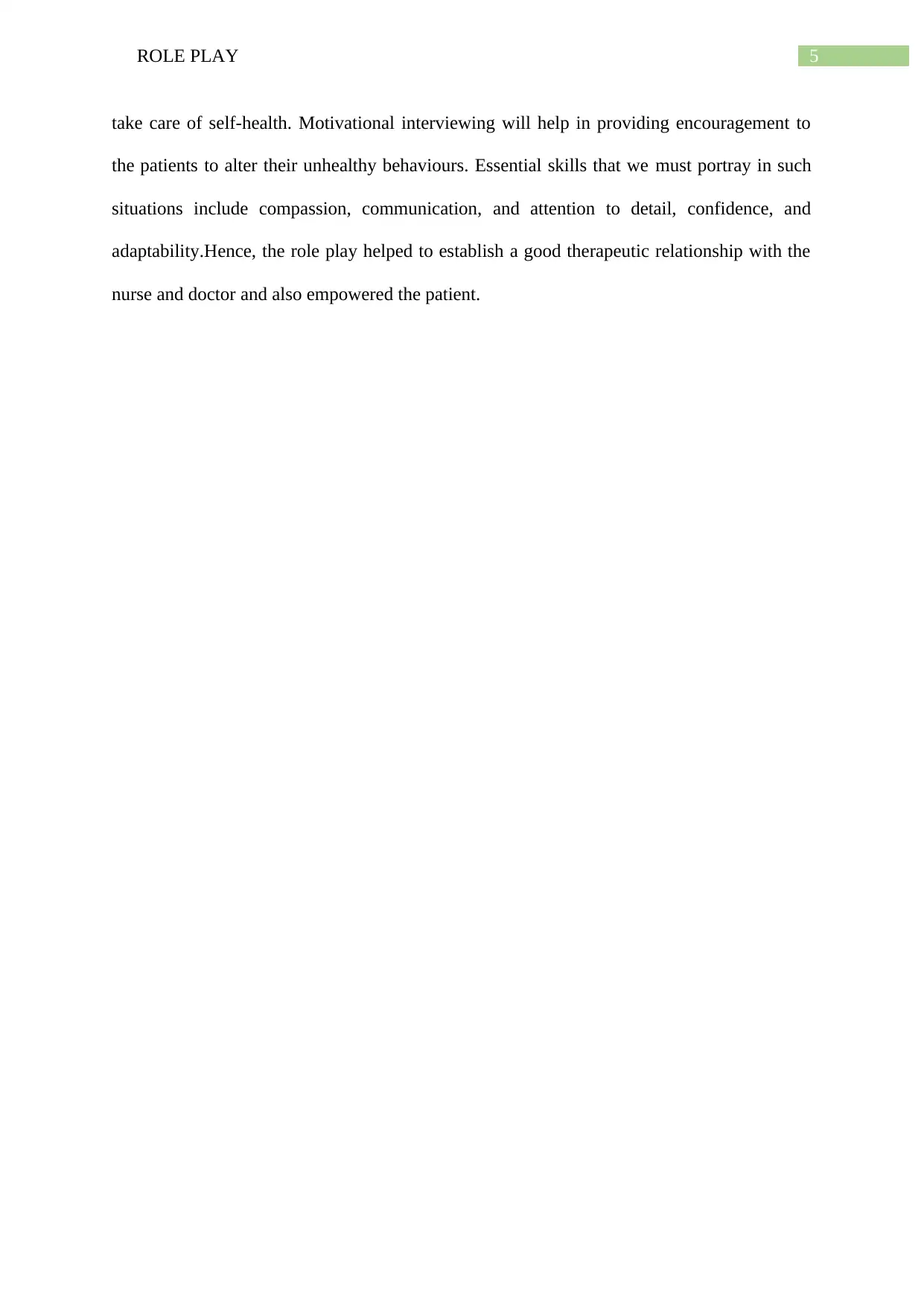
5ROLE PLAY
take care of self-health. Motivational interviewing will help in providing encouragement to
the patients to alter their unhealthy behaviours. Essential skills that we must portray in such
situations include compassion, communication, and attention to detail, confidence, and
adaptability.Hence, the role play helped to establish a good therapeutic relationship with the
nurse and doctor and also empowered the patient.
take care of self-health. Motivational interviewing will help in providing encouragement to
the patients to alter their unhealthy behaviours. Essential skills that we must portray in such
situations include compassion, communication, and attention to detail, confidence, and
adaptability.Hence, the role play helped to establish a good therapeutic relationship with the
nurse and doctor and also empowered the patient.
⊘ This is a preview!⊘
Do you want full access?
Subscribe today to unlock all pages.

Trusted by 1+ million students worldwide
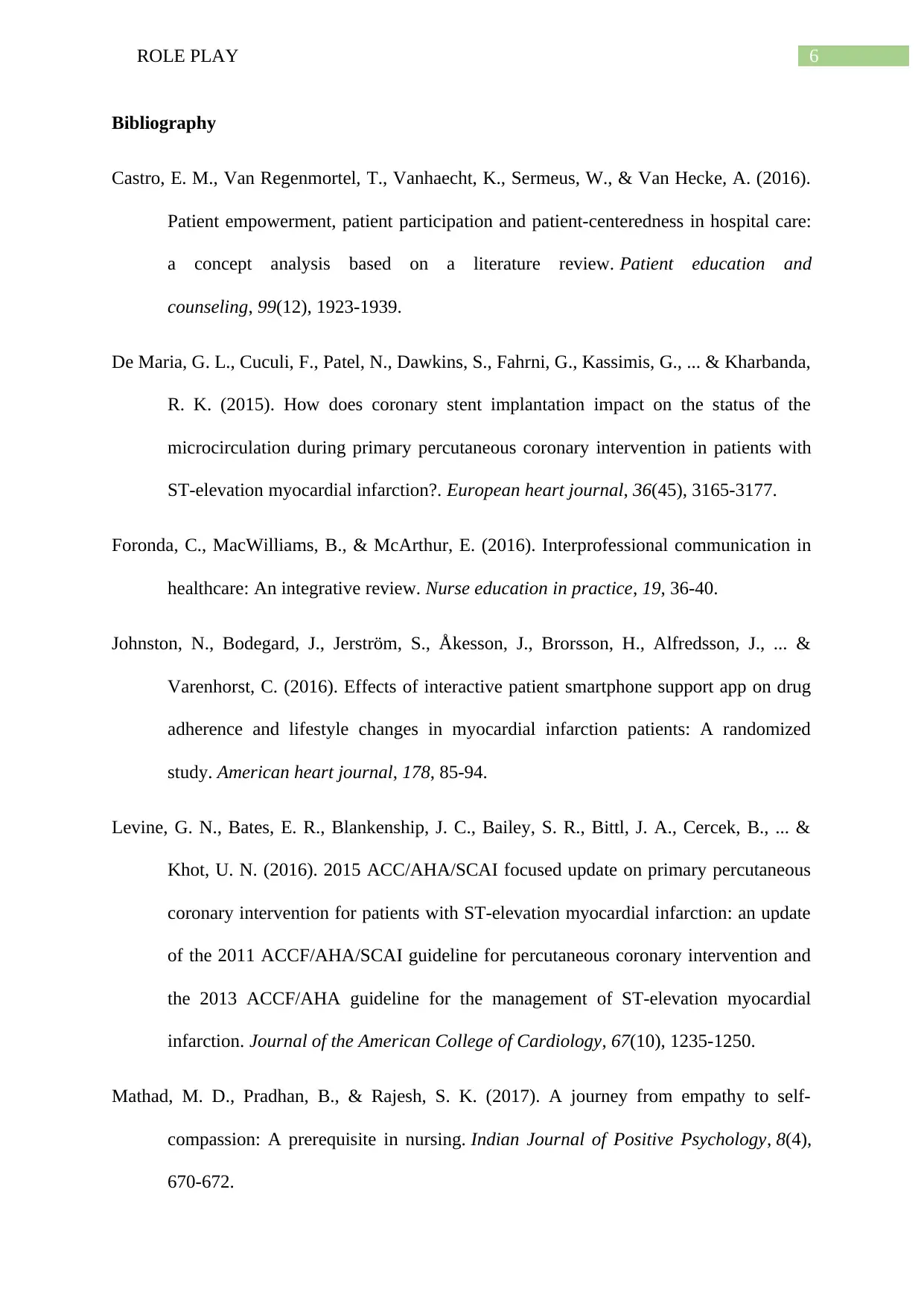
6ROLE PLAY
Bibliography
Castro, E. M., Van Regenmortel, T., Vanhaecht, K., Sermeus, W., & Van Hecke, A. (2016).
Patient empowerment, patient participation and patient-centeredness in hospital care:
a concept analysis based on a literature review. Patient education and
counseling, 99(12), 1923-1939.
De Maria, G. L., Cuculi, F., Patel, N., Dawkins, S., Fahrni, G., Kassimis, G., ... & Kharbanda,
R. K. (2015). How does coronary stent implantation impact on the status of the
microcirculation during primary percutaneous coronary intervention in patients with
ST-elevation myocardial infarction?. European heart journal, 36(45), 3165-3177.
Foronda, C., MacWilliams, B., & McArthur, E. (2016). Interprofessional communication in
healthcare: An integrative review. Nurse education in practice, 19, 36-40.
Johnston, N., Bodegard, J., Jerström, S., Åkesson, J., Brorsson, H., Alfredsson, J., ... &
Varenhorst, C. (2016). Effects of interactive patient smartphone support app on drug
adherence and lifestyle changes in myocardial infarction patients: A randomized
study. American heart journal, 178, 85-94.
Levine, G. N., Bates, E. R., Blankenship, J. C., Bailey, S. R., Bittl, J. A., Cercek, B., ... &
Khot, U. N. (2016). 2015 ACC/AHA/SCAI focused update on primary percutaneous
coronary intervention for patients with ST-elevation myocardial infarction: an update
of the 2011 ACCF/AHA/SCAI guideline for percutaneous coronary intervention and
the 2013 ACCF/AHA guideline for the management of ST-elevation myocardial
infarction. Journal of the American College of Cardiology, 67(10), 1235-1250.
Mathad, M. D., Pradhan, B., & Rajesh, S. K. (2017). A journey from empathy to self-
compassion: A prerequisite in nursing. Indian Journal of Positive Psychology, 8(4),
670-672.
Bibliography
Castro, E. M., Van Regenmortel, T., Vanhaecht, K., Sermeus, W., & Van Hecke, A. (2016).
Patient empowerment, patient participation and patient-centeredness in hospital care:
a concept analysis based on a literature review. Patient education and
counseling, 99(12), 1923-1939.
De Maria, G. L., Cuculi, F., Patel, N., Dawkins, S., Fahrni, G., Kassimis, G., ... & Kharbanda,
R. K. (2015). How does coronary stent implantation impact on the status of the
microcirculation during primary percutaneous coronary intervention in patients with
ST-elevation myocardial infarction?. European heart journal, 36(45), 3165-3177.
Foronda, C., MacWilliams, B., & McArthur, E. (2016). Interprofessional communication in
healthcare: An integrative review. Nurse education in practice, 19, 36-40.
Johnston, N., Bodegard, J., Jerström, S., Åkesson, J., Brorsson, H., Alfredsson, J., ... &
Varenhorst, C. (2016). Effects of interactive patient smartphone support app on drug
adherence and lifestyle changes in myocardial infarction patients: A randomized
study. American heart journal, 178, 85-94.
Levine, G. N., Bates, E. R., Blankenship, J. C., Bailey, S. R., Bittl, J. A., Cercek, B., ... &
Khot, U. N. (2016). 2015 ACC/AHA/SCAI focused update on primary percutaneous
coronary intervention for patients with ST-elevation myocardial infarction: an update
of the 2011 ACCF/AHA/SCAI guideline for percutaneous coronary intervention and
the 2013 ACCF/AHA guideline for the management of ST-elevation myocardial
infarction. Journal of the American College of Cardiology, 67(10), 1235-1250.
Mathad, M. D., Pradhan, B., & Rajesh, S. K. (2017). A journey from empathy to self-
compassion: A prerequisite in nursing. Indian Journal of Positive Psychology, 8(4),
670-672.
Paraphrase This Document
Need a fresh take? Get an instant paraphrase of this document with our AI Paraphraser
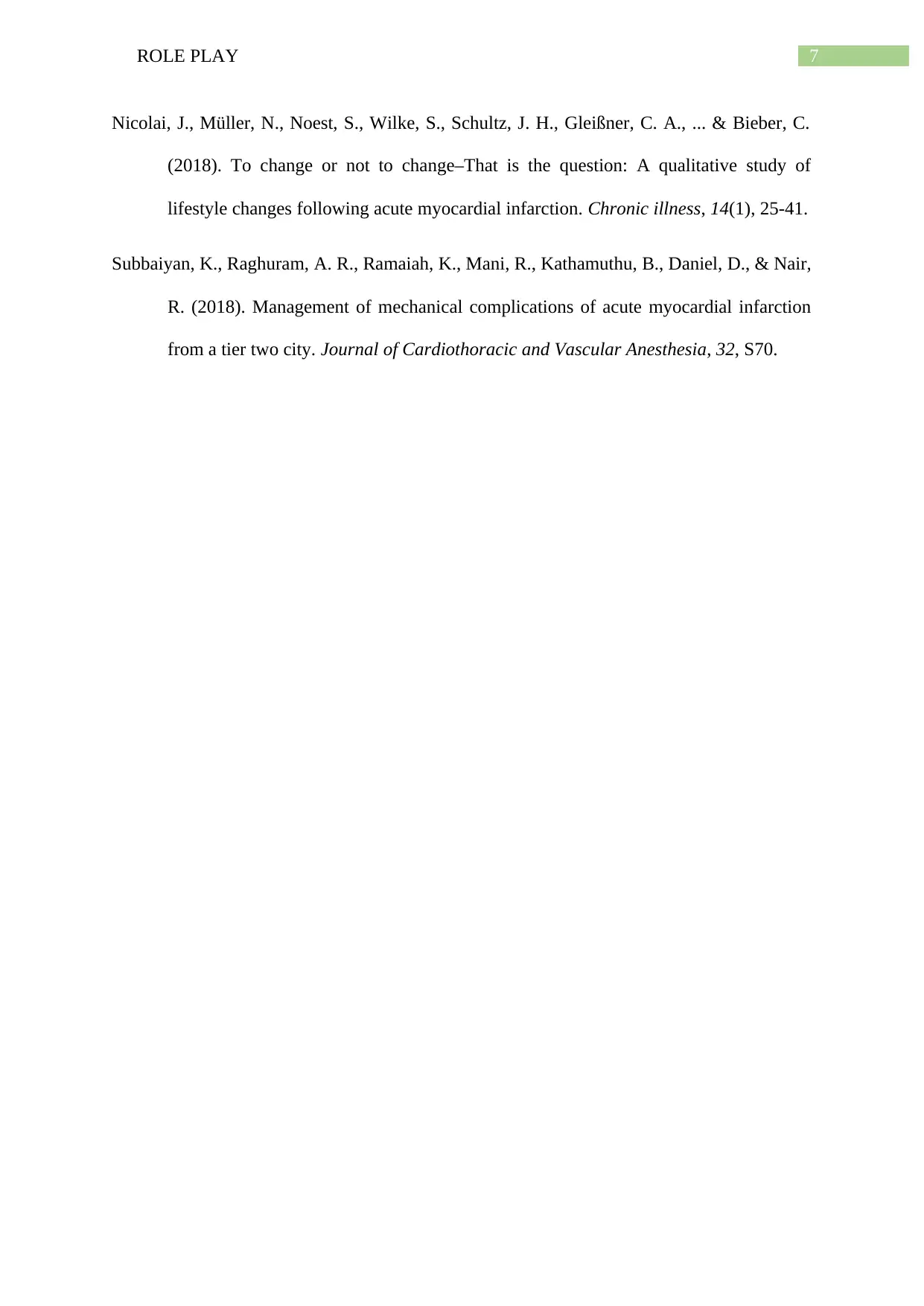
7ROLE PLAY
Nicolai, J., Müller, N., Noest, S., Wilke, S., Schultz, J. H., Gleißner, C. A., ... & Bieber, C.
(2018). To change or not to change–That is the question: A qualitative study of
lifestyle changes following acute myocardial infarction. Chronic illness, 14(1), 25-41.
Subbaiyan, K., Raghuram, A. R., Ramaiah, K., Mani, R., Kathamuthu, B., Daniel, D., & Nair,
R. (2018). Management of mechanical complications of acute myocardial infarction
from a tier two city. Journal of Cardiothoracic and Vascular Anesthesia, 32, S70.
Nicolai, J., Müller, N., Noest, S., Wilke, S., Schultz, J. H., Gleißner, C. A., ... & Bieber, C.
(2018). To change or not to change–That is the question: A qualitative study of
lifestyle changes following acute myocardial infarction. Chronic illness, 14(1), 25-41.
Subbaiyan, K., Raghuram, A. R., Ramaiah, K., Mani, R., Kathamuthu, B., Daniel, D., & Nair,
R. (2018). Management of mechanical complications of acute myocardial infarction
from a tier two city. Journal of Cardiothoracic and Vascular Anesthesia, 32, S70.
1 out of 8
Related Documents
Your All-in-One AI-Powered Toolkit for Academic Success.
+13062052269
info@desklib.com
Available 24*7 on WhatsApp / Email
![[object Object]](/_next/static/media/star-bottom.7253800d.svg)
Unlock your academic potential
Copyright © 2020–2025 A2Z Services. All Rights Reserved. Developed and managed by ZUCOL.





